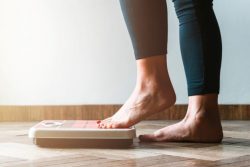Weight and Sleep Apnea: Understanding the Connection
February 23, 2023
You have probably heard it said that obese people are more likely to suffer from obstructive sleep apnea (OSA). That is true. But have you ever wondered about the cause-and-effect aspect of their relationship? Does weight gain cause sleep apnea, or does sleep apnea cause weight gain? This blog post delves into the fascinating connection between weight and sleep apnea. It also provides guidance on how you can safeguard your health.
Weight Gain Can Contribute to OSA
Obstructive sleep apnea occurs when tissues in the throat block the free flow of oxygen during sleep. This can occur due to natural anatomical abnormalities. However, it can also be the result of excess fatty tissue around the neck. Hence, individuals with a larger neck circumference are more likely to suffer from OSA.
Abdominal weight gain can also be a factor in OSA. Large amounts of visceral fatty tissue could place pressure on the lungs and make it more difficult for an individual to get all the oxygen they need during sleep.
Of course, this information isn’t to say that everyone in a larger body will develop OSA. Some people with a higher weight have no nighttime breathing problems.
OSA Can Contribute to Weight Gain
The relationship between OSA and weight gain is a two-way street. When a person does not get enough high-quality sleep, it can affect how their body produces and uses various hormones. For example, someone who is tired all the time is more likely to have increased levels of ghrelin (a hormone that causes hunger) and decreased levels of leptin (a hormone that decreases hunger). Hence, such individuals are more likely to overeat.
OSA can also lead to insulin resistance. Insulin is the hormone that is responsible for taking sugar out of your blood and storing it in your cells. When your body does not use insulin as efficiently as it should, blood sugar is more likely to be stored as fat.
What Can You Do?
OSA and weight gain can seem like they create a vicious cycle. Fortunately, you can break free! Here are some practical steps to take:
- Seek OSA treatment. OSA treatment can allow you to breathe easily at night. You may therefore have more energy to exercise and have fewer food cravings.
- Adopt other good sleep habits. For example, you should have a high-quality mattress and avoid drinking alcohol and caffeine close to bedtime.
- Exercise regularly. Exercise may help with weight loss. Even if it does not help you shed excess pounds, though, it still has the potential to decrease the severity of your sleep apnea.
- Talk to your doctor about weight management. Weight loss can be extremely challenging. An empathic physician can give you advice about your diet and possibly prescribe helpful medications.
OSA and weight gain often go hand-in-hand. The good news is that there are some simple things you can do to protect your health.
Meet the Sleep Apnea Expert
Dr. Kenneth Mogell is double-board certified in dental sleep medicine. For many years, he has been helping patients in Vero Beach and nearby communities to find freedom from OSA. If you would like to find out how he and our team may be able to serve you, give us a call at 772-882-6800.
